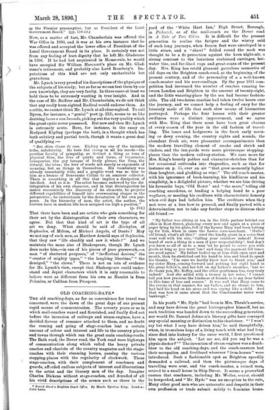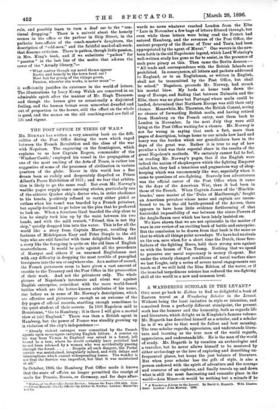OLD COACHING--DAYS.*
THE old coaching.days, as far as convenience for travel was concerned, were the dawn of the great days of our present rapid means of communication. The seventy years or so in which mail-coaches waxed and flourished, and finally died out before the incursion of railways and steam-engines, have a decided flavour of romance attached to them, and no doubt the coming and going of stage-coaches lent a certain amount of colour and interest and life to the country places and towns through which ran the great main coaching-roads. The Bath road, the Dover road, the York road were highways of communication along which rolled the heavy private coaches and chariots of the country magnates and the stage- coaches with their steaming horses, passing the various stopping-places with the regularity of clockwork. These stage-coaches, with their complement of coachmen and guards, afforded endless subjects of interest and illustrations to the artist and the literary men of the day. Imagine Charles Dickens without stage-coaches, and denuded of all his vivid descriptions of the scenes such as those in the • &mind About *Brighton Coach Olice. By. Mande Egerton King. Louden.: John Lane.
yard of the White Hart Inn,' High Street, Borough,
in Pickwick, or of the mail-coach on the Dover road in A Tale of Two Cities. It is difficult for the present
generation to realise the fatigue and the wintry oold of such long journeys, when frozen feet were enveloped in little straw, and a " shawl" folded round the neck was thought to be a fit protection against the keen night-air, a strong contrast to the luxurious cushioned carriages, hot- water tins, and fur-lined rugs and great-coats of the present day. Mrs. King has retold pleasant garrulous memories of old days on the Brighton coach-road, at the beginning of the present century, and of the personality of a a well-known coach-master and his surroundings. By the year 1811 com- petition had increased the number of coaches running be- tween London and Brighton to the amount of twenty-eight, and the little watering-place by the sea had become fashion- able. The old two-horse coaches had taken twelve hours over the journey, and we cannot help a feeling of envy for the leisurely mode of life that such slow means of locomotion portrayed. Perhaps the four horses with their greater swiftness were a distinct improvement, and we agree
with Mrs. King that there must have been great charms at every season of the year in the old fashion of travel- ling. The lanes and hedgerows in the fresh early morn-
ing or dewy evening, the country sights and sounds, the abundant fresh air, were pleasanter accompaniments than the modern travelling element of smoke and shriek and cinders, and the inn-yards were more picturesque stopping- places than the modern railway-station. We care more for Mrs. King's homely pathos and character-sketches than for her occasional outbreaks into rhapsodies, such as that for instance on p. 55, over an air "that grew momently lighter than laughter, and gladding as wine." The old coach-master, with his ignorance of book-learning, his kindliness and his simplicity, is a delightful picture, whether we see him driving his favourite bays, Old Boxer' and "the mare," telling old coaching anecdotes, or lending a helping hand to a poor wayfarer, or meeting his creditors with characteristic honesty when evil days had befallen him. The creditors when they met were at a loss how to proceed, and finally parted with a determination not to take any further steps to distress their old friend :-
"My father was sitting at tea in the little parlour behind our office in East Street, glancing every now and again at a piece of paper lying by his plate, full of the figures Mary had been totting up for him, when in came the Lewes corn-merchant. Hullo ! old friend, what's all this ? ' cried the kindly giant in a voice that went well with his size, ' Calling your creditors indeed I Never heard of such a thing in a man of your respectability I And don't you know as all of us to a man 'ud be proud to serve you with goods as long as you want 'em ? and dang the payment till times are good again.' My father looked up at him with open eyes and mouth, then he stretched out his hand to him and tried to speak his thanks. 'I'm aura we hardly know how to thank you,' said my sister Mary, coming forward and putting her right hand in the great fellow's, and her left on my father's shoulder, but we do thank you, Mr. Roffey, and the other gentleman too, very truly indeed.' And she added with a tremor in her voice, 'I cannot tell you how precious the kindness of friends is to my dear father in this time of loss and sorrow.' It was well that Mary came to the rescue in that manner, for my father, and no shame to him, had laid his head on his arms and was crying like a child. And that was how it came about that the Coachmaster never went bankrupt."
In his youth "Mr. Hyde "bad been in Mrs. Thrale's service,
and may have driven the great lexicographer himself, but no such tradition was handed down to the succeeding generation,
nor would Dr. Samuel Johnson's literary gifts have conveyed any special meaning or distinction to his charioteer. "I won't say but what I may have driven him,' he said thoughtfully,
when, in tremulous hope of a living touch with what bad long since died into history for the outer world, I first questioned him upon the subject. Let me see, did you say he was a physic-doctor ' " The invention of steam-engines was a death- blow to the old coaching-days, and the coach-masters lost their occupation and livelihood wherever " iron-horses " were introduced. Such a fashionable spot as Brighton speedily
demanded a railroad, and then the picturesque days of travelling were over, and the coach-master, a ruined man, retired to a small house in Ship Street. It seems a proverbial custom that coachmen, including Mr. Weller, senior, should be henpecked, and "Mr. Hyde" was no exception to the rule, Many other good men who are autocratic and despotic in their own profession or trade submit mildly to feminine home-
rule, and possibly learn to turn a deaf ear to the " con- tinual dropping." There is a naiveté about the homely scenes in the office or the parlour in Ship Street, in the pathetic love-affairs of the coach-master's daughters, the description of "odd-men," and the faithful maid-of-all-work, that disarms criticism. There is pathos, though little passion, in Mrs. King's book, and if we substitute " pathos " for
" passion " in the last line of the motto that adorns the cover of the "Arcady library,"—
" What matter though my novel theme appear Rustic and homely to the town-bred ear ? Meet but for gossip of the village green, Passion, where'er she works, is never mean"— it sufficiently justifies its existence in the world of letters.
The illustrations by Lucy Kemp Welch are conceived in an admirable spirit after the manner of Mr. Hugh Thomson, and though the horses give us occasionally a disjointed feeling, and the human beings seem somewhat dwarfed and out of proportion to the horses, still the effect on the whole is good, and the scenes on the old coaching-road are full of life and vigour.







































 Previous page
Previous page